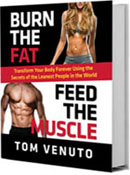Attitudes are mental, but there’s no question they affect you physically in every possible way. The right attitudes lead you to peak health and fitness. The wrong attitudes sabotage even the best-designed diet and workout programs. There’s one attitude problem in particular that kills the diet and exercise programs of thousands of people every year – it’s called the “all or nothing” attitude. Psychologists call it “dichotomous thinking” or “cognitive distortion.”
 Below you’ll see 8 of the most common all-or-none attitudes as they relate to diet and exercise. There are surely more, but these are some of the most insidious.
Below you’ll see 8 of the most common all-or-none attitudes as they relate to diet and exercise. There are surely more, but these are some of the most insidious.
1. “I don’t have any time to exercise.”
You may be busy, and you may have many responsibilities, but we all have the same amount of time – all the time there is: 24 hours a day. The truth is, getting things done is not about time available, it’s about priorities – the choices we make about what is most important to us.
The best way to make exercise and nutrition top priorities today is to make health your highest value in life. Remind yourself every day that all the other stuff you were so busy about means nothing without your health.
Self-care has to be your number one priority, because without your health, you can’t take care of anything else, including your job, your business or your own family.
The most insidious part about repeating, “I don’t have time to exercise” is that it decays into an all or nothing attitude about fitness. That’s where someone says, “I’m so busy, I can’t work out as long or often as I’m supposed to, so what’s the use? I’ll start later when I have more time to do the whole program right.”
“Doing it right later” may seem like a noble intention, but it leads to a cycle of putting it off that’s hard to break. Professional procrastinators ultimately find that they never have more time to “do it right.” Your schedule always has an uncanny way of filling up.
Here’s how to conquer this all or nothing attitude: Not only must you put health on the top of your priority list, you must also remember that any exercise is better than no exercise and there are ways to get more results in less time, if you’re willing to work smart and work with intensity and focus.
Break your time in smaller chunks. Don’t imagine workouts taking hours, or huge chunks of your entire morning, afternoon or evening. Instead, if you visualize your day broken down into small 30 minute or even 15 minute chunks, and slip short workouts into one of those small windows, the task no longer seems so daunting.
Be sure to schedule the exact time and place in writing. “I will work out 30 minutes, 3 times a week” is not good enough. A real plan would be something like, “I will do 30 minutes of full body weight training during my lunch break between 12 and 12:30 every Monday, Wednesday and Friday at the office gym.” Psychologists have found that this one simple planning intervention can more than double the success rate compared to non-planners.
It’s amazing what some people accomplish in a one-hour lunch break: 5 minutes to change, 30 minutes to train, 10 minutes to shower, 15 minutes to eat. Others take an hour to eat, socialize and check Facebook. I know hundreds of people who achieved their fitness goals after years of failure, with one strategy: They stopped saying “I have no time,” they set their alarm clocks 30 minutes earlier and started their day with a short but vigorous workout.
The ideal amount of training time for maximum results and what’s realistic in the real world may be very different. You may not always be able to do the “ideal” amount of exercise 100% of the time. That’s okay. Start with short, time-efficient workouts and add more later when you can.
2. “I injured my _____________, so I can’t exercise at all.”
I could never figure out how something like a foot injury could lead someone to believe they can’t do any exercise at all, or even more bizarre, that they can’t follow a healthy diet either.
Naturally, some injuries can lay you up completely, and you should always follow the advice of your doctor. However, many common injuries are localized. For example, knee, shoulder, ankle or elbow pain may prevent activity around those joints, but not necessarily in the rest of the body.
Local pain or injury often leads to an all or nothing generalization such as, “My foot is out of commission, so I can’t work out.” Really? What about your abs? How about your upper body? Shoulders, biceps, triceps? Chest? Upper back? What about your other leg? I’ve seen people training diligently at my gym with a cast on one leg many times!
What’s even more damaging is the all or nothing attitude that occurs when all exercise really is restricted. If you have doctor’s orders for no exercise at all, then you might tell yourself, “Oh well, no sense in starting this diet since I can’t work out for the next 8 weeks.”
The remedy for this version of all or none attitude is “possibility thinking,” which means you think in CANS not CANTS. Ask yourself, “What CAN I do,” (or “What can I do INSTEAD”), rather than “what can’t I do”? If there’s a health or medical issue involved, ask your doctor the same question: “Doc, I know I can’t do THIS, but can I do THAT?”
3. “There are good fat loss foods and bad fat loss foods”
When it comes to fat loss, there are no good or bad foods. Fat loss doesn’t come from eating certain “good” foods, it comes from creating a caloric deficit and sustaining that deficit. Regardless of what foods you eat, you will still lose weight if you have a caloric deficit.
If that’s true, then why not eat a junk food diet and be sure to have a deficit? The answer is because fat loss should not be your only goal. Health should also be your goal, and arguably health should be one of the highest values and priorities in your life.
So does that mean processed, refined (“junk”) foods are bad? Not necessarily. It’s psychologically more beneficial to look at them as simply less healthy and less nutritious and it’s best to eat them infrequently and in limited quantities rather than think of them as forbidden.
You’re also more likely to overeat processed foods (for example refined sugars, and especially refined sugars and fats together) because they’re so palatable and calorie dense, so many people consider them “bad” for that reason. They’re correct to be cautious about these “calorie bombs,” but using the terms good or bad to describe different foods is not constructive because it dichotomizes them, leading to all or nothing decisions and possibly even eating disorders.
What’s most alarming is that psychology research repeatedly confirms that all kinds of dichotomous thinking about food leads to higher rates of relapse and weight regain.
You’ll be much happier and more successful long term if you look at foods in terms of dose and context, not in terms of good or bad. An occasionally sugary treat will not have a negative effect on your fat loss or health if the dose is small (so that you still have a calorie deficit). It will also have no negative effect if you have it infrequently, such as on the occasional birthday or holiday when eating some cake or pie, or the once a week night out with friends or family.
If you continue seeing certain foods as bad you’ll feel deprived for missing out on social life and you’ll get trapped in cycles of guilt and punishment or feelings of weakness and failure if you ever eat those foods.
Do yourself a favor and drop the good or bad labels. If anything, put your focus on having a list of healthy, unprocessed foods that you’ll commit to eating most of the time (which leaves room for occasional indulgences…. leading us to number four):
4.”I have to eat 100% clean food to get results.”
In a word, this attitude could be described as dietary “perfectionism.”
In striving to be 100% perfect on a nutrition program, you often fall prey to the psychological truism that you tend to crave what you’re not allowed to have. Trying to eat “clean” 100% of the time, or be “perfect” on your diet is usually a recipe for failure.
Depriving yourself of foods you enjoy is not only unnecessary, it’s counter-productive to your long term success and happiness. Most people are more successful by setting a food quality compliance rule they know they can live with.
For example, pledge to yourself that you will eat mostly unprocessed, nutrient-rich foods 90% of the time. The other 10% of the time is for your “free meals” where you eat anything you want.
That 10% is your psychological release valve. without it, the pressure of deprivation will build up and a binge is almost inevitable.
For good health, all you have to do is be sure the majority of your calories come from unrefined, nutrient-rich foods.
To lose weight, all you have to do is consistently stay in a calorie deficit (eat fewer calories than you burn). Specific foods don’t turn into fat. Excess calories do.
5. “I cheated on one meal and ate junk, so my entire day is blown!”
Many people see one diet mistake as a reason to give up on their entire day or even more strangely, as an excuse to binge. Why? Because their brain is in all or nothing mode. Their day wasn’t perfect, so their focus instantly shifts to starting over tomorrow.
There are two simple fixes for this.
The first fix is if you slip off track JUST GET BACK ON! And do it as quickly as possible. Not tomorrow. Not on Monday. Today. Your new affirmation is, “I’m only one meal away from being back on my plan!”
The second fix is to establish, in advance, an adherence rule as I mentioned above. When you understand that you can get great results from eating nutritious food 90% of the time, then if you mess up a meal or two, you know that won’t make or break you. You won’t feel guilty or worry because you can just count that slip up as one of your 10% meals.
In fact, if you adopt this 90-10 approach, then you’ll realize that eating whatever you want 10% of the time is not even a slip-up at all, it’s part of the program. Eating healthy, unprocessed food 90% of the time is 100% success, because 90% compliance was your guideline in the first place.
6. “I messed up this week, so I have to start the whole program over again!”
I’ve lost count of how many people I’ve met who started 12-week transformation contests or multi-month physique competition preps who dropped out mid-way through, even after weeks of hard work, making substantial progress.
Why? Because they messed up a weekend, or even just a single day, and in their minds, they thought this meant the whole 12 weeks was blown. They believed they had to drop out and start over again from day one, week one – usually at some date in the future. Their contest plans are abandoned.
To avoid falling prey to the “start the whole program over from scratch” attitude, remind yourself that just like slipping up for one meal does not ruin a whole day, an entire day or weekend off your plan does not ruin an entire program or training phase.
Even if you really did lose time, like a whole week sidetracked from your plan, a three or four month goal gives you plenty of time to compensate. I’ve seen comebacks from behind that would knock your socks off. Trust me, you’re still in the game.
Remember what Bear Bryant once said, “Don’t give up at half time. Concentrate on winning the second half.”
7. “I didn’t meet my deadline, so I failed to reach my goal and I’m a failure!”
The “I didn’t reach my goal on time, so I’m a failure” attitude is a dangerous one. That’s because some people take what could be an important learning experience, and not only call it a failure, but also generalize it to their self-image and identity.
Here’s what I mean: One dieter might say, “I failed to reach my weight loss goal,” while another might say, “I didn’t reach my weight loss goal, so I am a failure.” The second person has made a grave error. Denis Waitley once said, “Failure is an event, not a person.”
If you choose, you don’t have to accept a missed deadline as failure at all. You can re-frame it like this: If you don’t reach your goal in the time frame you initially set – you didn’t fail, you simply underestimated your completion date.
As another great football coach once said, “We didn’t lose the game, we just ran out of time.”
The truth is, we usually don’t know how long it will take to reach a goal, we simply make an educated guess. If you underestimated the time, keep your goal, set a new deadline date and carry on.
8. “I can’t train because ___________ so there’s no point in dieting” or, “I can’t diet because ______________ so there’s no point in training.”
People argue all the time over which is more important, diet or exercise. You’ve got to get your calorie intake right to lose weight, so we could agree that nutrition is priority number one for weight loss. But eating nutritious food won’t make you fitter or stronger or transform your body.
For total fitness, you need both – nutrition and training. However, an all or nothing attitude about this can be a problem.
Suppose the doctor says you can’t train. You might figure that if you can’t train at all, there’s no point in dieting at all. You tell yourself you’ll start your diet and training together when you’re all healed up. After all, “If I can’t do it right and do both, what’s the point?”
Conversely, suppose you have a heavy travel schedule with weeks of airline, hotel and restaurant food, or you’re living somewhere that you have no control at all over what type of food is served. Some people think that if you can’t follow your usual diet, there’s no point in training.
The fact is, if you really can’t train, then nutrition is more important than ever! And if you can’t follow your usual diet, that doesn’t mean you should stop working on strength and fitness. Always do what you can.
Furthermore, there may be times when you can’t control what kind of food you’re served, but you always have control over how much you eat. That means you can always lose weight if you’re conscious of calories and control your portions.
Okay, but won’t your results be compromised without nutrition and training tougher? Sure, you’ll get optimal results doing both. But SOME results are better than ZERO results. It’s not all or nothing!
Also consider that it doesn’t take much training to simply maintain your current strength and fitness level. It’s not a crime to use a minimalist workout or go into maintenance mode at times when life gets hectic.
Letting your nutrition slide and stopping all physical activity, on the other hand, is a sure way to send you backward. And it’s downright silly to say, “I can’t train, so why bother to diet?”
Change your attitudes, change your results
It’s not always easy to spot these attitudes on your own, or even admit that your attitude needs work. But now that you’ve read this list and given yourself an honest appraisal, you may have discovered that your own “black and white” attitudes have been the only thing holding back your fitness or weight control efforts.
The good news is, though you can’t always control all your circumstances, you’re always in control of your attitudes.
Use the suggestions above for changing the way you think, and you’ll quickly see how true it is what William James wrote: “Human beings can alter their lives by altering their attitudes of mind.”
Train hard and expect success,
Tom Venuto, author of
Burn the Fat, Feed the Muscle (BFFM)
BFFM Guide To Flexible Dieting For Fat Loss







Thanks Tom. What an outstanding article! I appreciate the way you clearly put the problem thought and then the positive counter-truth and actions.
The one sentence that is easy to hold on and sums up the article for me is “Always do what you can”.
What a great article Tom and it came at a great time for me :) I’d say another great sentence that sums things up well is “Change your attitudes, change your results”. This surely was a big thing for me. It really does all start with our minds. I sure know we all are capable of anything we put our minds too also :) Never giving up on ourselves is the big key. Keep pushing forward no matter what’s going on in our lives :) You’re a good teacher :)